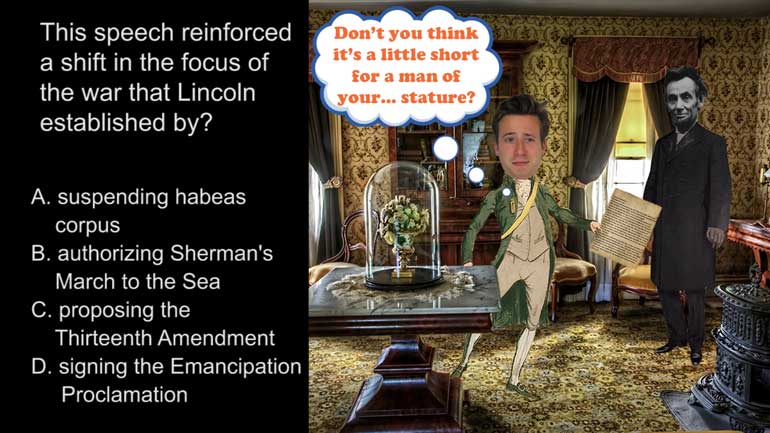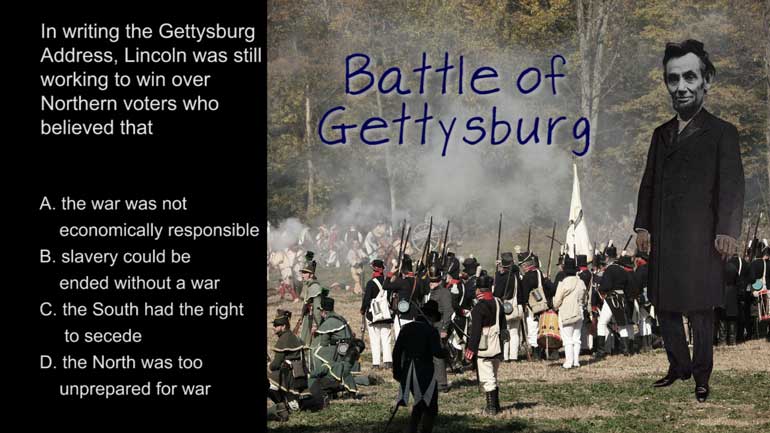ShmoopTube
Where Monty Python meets your 10th grade teacher.
Search Thousands of Shmoop Videos
AP U.S. History 1.1 Period 8: 1945-1980 252 Views
Share It!
Description:
In this AP U.S. History question read the excerpt and determine how it reflects on conceptual shifts in American Foreign Policy.
Transcript
- 00:00
[ musical flourish ]
- 00:04
And here's your Shmoop du jour, brought to you by a healthy democracy,
- 00:08
government with a balanced diet.
- 00:10
First up, the excerpt.
- 00:12
I want you! I want you!
Full Transcript
- 00:16
Okay, and the question.
- 00:18
The excerpt reflects which of the following conceptual shifts
- 00:22
in American foreign policy?
- 00:24
And here are your potential answers.
- 00:25
[ mumbles ]
- 00:29
All right.
- 00:30
What kind of "conceptual shift"
- 00:33
does the excerpt describe?
- 00:35
Well, we see that Truman says the U.S. must
- 00:37
"supervise the use of funds made available to Greece"
- 00:42
and make sure that foreign aid will
- 00:43
"help to build an economy in which a healthy democracy
- 00:48
can flourish." Got it?
- 00:50
So, basically, Truman wanted to make sure we got the right
- 00:52
ideological bang for our buck.
- 00:55
So let's see which answer best describes
- 00:57
Truman's new POV, or point of view.
- 01:00
Was the conceptual shift in American foreign policy
- 01:03
A - assuming a greater role in providing aid to all countries
- 01:06
involved in World War II?
- 01:08
Well, all the countries in World War II? Are you kidding?
- 01:10
Americans are generous but not that generous.
- 01:12
The aid Truman describes was only made available to Greece and Turkey,
- 01:16
so either American diplomats had a thing for Mediterranean food -
- 01:20
it's actually awesome - or something else was going on.
- 01:23
That knocks out A. Was the change in foreign policy
- 01:26
C - insisting that aid recipients be self-supporting?
- 01:30
Hmm? Well, Truman and his advisors certainly hoped
- 01:33
these countries would eventually be self-supporting,
- 01:36
but that condition was never a motivating force for the aid.
- 01:39
More like a nice-to-have situation. Cross out C.
- 01:43
All right. Could the shift in foreign policy have been D -
- 01:46
focusing almost exclusively on Western European nations? Huh.
- 01:51
Well, take a look at Europe right here. See Greece? Yeah.
- 01:54
It's always been on the edge here.
- 01:56
We're in Southern, maybe even Eastern Europe,
- 01:59
not Western Europe. Definitely off that map. So cross out D.
- 02:03
That means the conceptual shift in American foreign policy was
- 02:06
B - adopting a strategy of containment
- 02:08
for countries susceptible to that evil disease, communism.
- 02:12
Well, that's right. It was the spread of communism,
- 02:15
not Mediterranean food, unfortunately,
- 02:17
that had diplomats all aflutter.
- 02:19
At the end of World War II, American politicians were worried
- 02:22
that the Soviet Union (Russia)
- 02:24
would persuade other countries to align with the Soviet Bloc
- 02:27
so the U.S. offered carrots in the form of cash money to keep people on our side.
- 02:32
So B is the correct answer.
- 02:34
This foreign aid, though, came with lots of restrictions, including
- 02:37
how the economy and governments could conduct their business.
- 02:41
So much for those gifts that have no strings attached. Yeah.
- 02:45
[ scissors snip ]
Up Next
AP U.S. History Exam 2.45. The journey shown on the map was an example of...what?
Related Videos
AP U.S. History Exam 2.26. This speech reinforced a shift in the focus of the war that Lincoln established by...what?
What did the Spanish messengers bring with them to North America? Hint: you probably wouldn't be thrilled to get this for your next birthday.
AP U.S. History Diagnostic 24. How did the United States choose containment over the National Security Council Report in Latin America?
AP U.S. History Exam 2.25. In writing the Gettysburg Address, Lincoln was still working to win over Northern voters who believed that...what?




